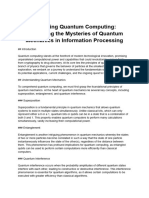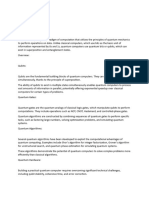Quantum Computing and Cryptography
Quantum computing represents a paradigm shift in computation, leveraging the principles of
quantum mechanics to perform operations at unprecedented speeds. This document delves into the
interplay between quantum computing and cryptography, focusing on the implications for security
and data protection.
At the heart of quantum computing are qubits, which unlike classical bits, can exist in superpositions
of states. This property, along with quantum entanglement and interference, allows quantum
computers to solve certain problems exponentially faster than classical counterparts.
Quantum cryptography leverages these properties for secure communication. Protocols like
Quantum Key Distribution (QKD) use quantum mechanics to enable unconditionally secure key
exchange. The BB84 protocol, for instance, ensures that any eavesdropping attempt alters the
quantum state, alerting the communicating parties.
However, quantum computing also poses threats to current cryptographic systems. Shor's
algorithm, running on a sufficiently powerful quantum computer, can factorize large integers in
polynomial time, breaking widely used encryption schemes like RSA and ECC. Similarly, Grover's
algorithm can speed up the search for symmetric keys, reducing the effective security level of AES.
To counter these threats, post-quantum cryptography (PQC) is under development. PQC algorithms,
such as lattice-based cryptography, hash-based cryptography, and multivariate polynomial
equations, aim to provide security even in the presence of quantum computers.
The race to achieve quantum supremacy and practical quantum computing capabilities underscores
the urgency for the cryptographic community to transition to quantum-safe protocols. Research and
�collaboration are essential to secure digital infrastructure against future quantum threats.
























































